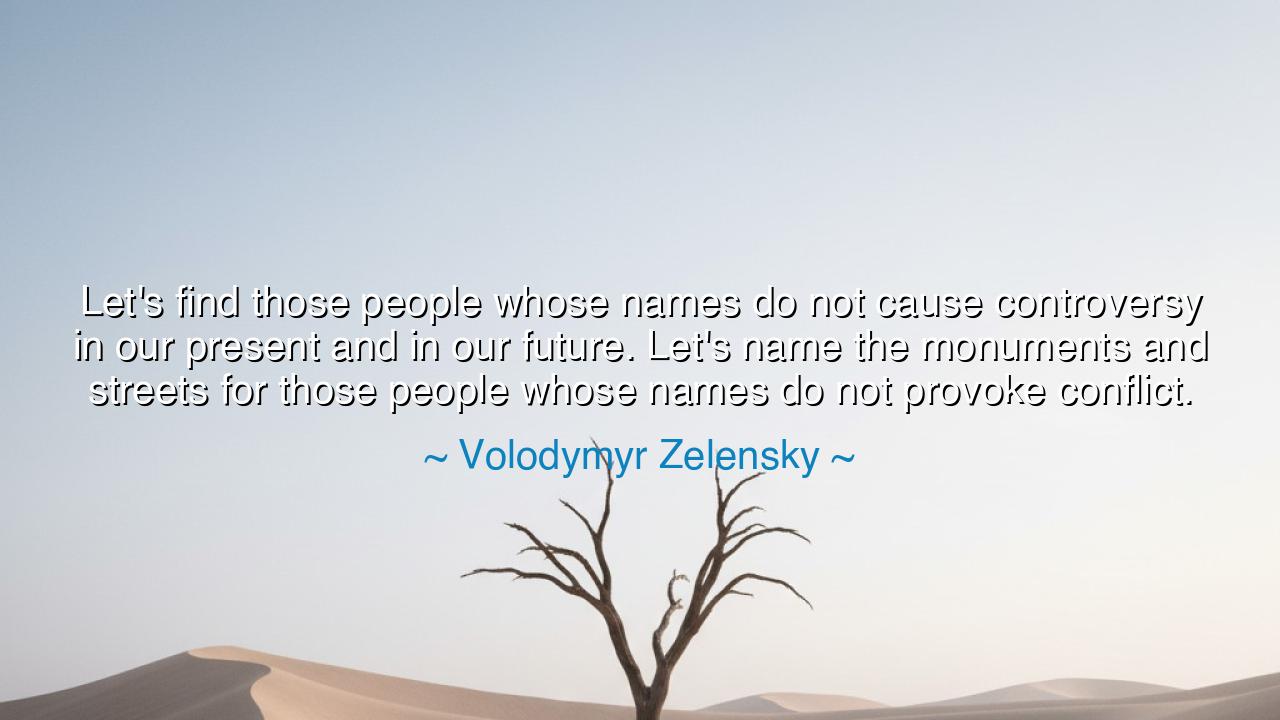
Let's find those people whose names do not cause controversy in
Let's find those people whose names do not cause controversy in our present and in our future. Let's name the monuments and streets for those people whose names do not provoke conflict.






In the ever-flowing current of time, societies are shaped not only by the actions of their people but by the names they choose to honor, the legacies they wish to preserve, and the symbols they erect in tribute. Volodymyr Zelensky’s words, "Let's find those people whose names do not cause controversy in our present and in our future. Let's name the monuments and streets for those people whose names do not provoke conflict," carry the weight of a deeply profound truth. The names we choose to immortalize, the monuments we build, and the streets we name are not merely markers of the past, but reflections of the values we wish to carry forward. Zelensky’s call is a reminder that the heroes we choose to honor must unite us, not divide us, as we look to the future.
In the ancient world, names held immense power. The Greeks, for example, believed that the name of a person or a place was intimately tied to their identity and their legacy. To name something was to shape its essence. The great city of Athens, for instance, was named after the goddess Athena, symbolizing the values of wisdom, strategy, and justice. To name a place or a person after a deity or a revered figure was to imbue it with divine meaning. The Romans followed a similar practice when naming their cities, streets, and monuments. Each name was a reflection of the society’s deepest ideals and goals. Zelensky’s call to seek names that do not provoke conflict is a call to create a future where the names we choose foster unity, peace, and progress.
Consider the ancient figure of Pericles, the Athenian leader who led during the Golden Age of Athens. Pericles understood the power of legacy and symbolism. He oversaw the construction of the Parthenon, a monument to the goddess Athena, which embodied the values of Athens at the height of its power. His name, associated with the flourishing of art, philosophy, and democracy, was one that brought unity and pride to the people of Athens. In contrast, a name associated with tyranny or injustice would have been a source of division, a constant reminder of a painful and turbulent past. This example underscores the importance of choosing names that align with the collective vision of a society, as Zelensky urges, so that the symbols we leave behind bring us closer, not further apart.
Zelensky’s call also resonates with the story of the American Revolution and the building of a new nation. In the early days of the United States, the Founding Fathers, such as George Washington and Thomas Jefferson, made deliberate efforts to create a symbolic foundation for the young republic. They named cities, monuments, and institutions to reflect the values of liberty, justice, and equality. Yet, even in this era of founding, there was much debate about which figures should be honored. Names associated with the oppression of Native Americans or the slavery of African people sparked controversy, even as they were celebrated in certain parts of society. The tension between honoring past heroes and addressing the injustices they perpetuated continues to this day, illustrating the deep impact that names and monuments have on a society’s self-image and collective conscience.
The lesson in Zelensky’s words is both urgent and profound: as we build the future, we must choose to honor figures whose names embody the values that will unite us. We must carefully consider the names we inscribe in our cities and on our monuments, for they are not simply markers of history, but reflections of the society we wish to create. Just as the Greeks and Romans used names to inspire their people and remind them of their highest ideals, so too must we use names to remind ourselves of what we aspire to be—just, fair, and peaceful. The names we choose should embody the ideals we want to perpetuate, not the division and conflict that tear us apart.
In practical terms, this means questioning the monuments we build and the figures we choose to honor. Are these names a reflection of the values we hold dear, or do they perpetuate division and pain? Are the people we honor with streets and statues figures who foster unity, or do they serve to remind us of past wrongs? Zelensky’s words call upon us to engage in a deep, collective reflection about the symbols we carry into the future. Just as the ancients carefully chose their heroes, we too must choose wisely whom we raise up, ensuring that the legacies we perpetuate inspire healing, reconciliation, and progress.
Ultimately, the future is shaped by the choices we make in the present. The names we choose to honor, the monuments we erect, and the symbols we embrace are not just reflections of the past—they are blueprints for the future. By choosing names that embody unity, peace, and justice, we can build a world where all people feel valued and seen. The legacy we leave is not just written in history, but in the symbols we create and the names we choose to preserve. Let us, therefore, ensure that those names inspire a future that is one of hope and shared progress, where the echoes of the past no longer divide us, but instead guide us toward a collective future that honors the dignity and potential of all people.






AAdministratorAdministrator
Welcome, honored guests. Please leave a comment, we will respond soon